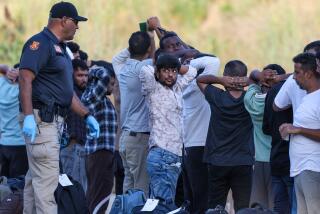House hearing showcases disagreement on radicalization of U.S. Muslims
- Share via
Reporting from Washington — Melvin Bledsoe, speaking in his deep Tennessee accent at a long-awaited House Homeland Security Committee hearing on the domestic radicalization of U.S. Muslims, said his son Carlos “was captured by people best described as hunters” after he converted to Islam.
“He was manipulated and lied to,” Bledsoe said, recalling the events that preceded his son’s arrest in an attack on an Army recruiting station and the death of a soldier.
His testimony that his son was radicalized by Muslims in Tennessee bolstered assertions by committee Chairman Rep. Peter T. King (R-N.Y.) that more needs to be done to investigate radical U.S. Muslims and convince Islamic leaders they must cooperate with authorities.
But prosecutors in Little Rock, Ark., where the 2009 shooting occurred, tell a different story. They believe Carlos Bledsoe, now known as Abdulhakim Mujahid Muhammad, was radicalized while abroad in Yemen, where he spent time with extremists in jail, and they have not charged him with terrorism. Rather, he likely will go to trial later this year on a state charge of capital murder.
That dispute symbolized the divide at the hearing, the first in a series that critics of King — Democrats on the panel as well as leading Muslim officials — said could exacerbate the problem of homegrown terrorism rather than help end it.
A defiant King said after the hearing that he had “broken down a wall of political correctness on an issue that needs to be addressed.” At the beginning, he blasted his many critics, saying they had engaged in “paroxysms of rage and hysteria.”
Bledsoe was one of four witnesses Thursday. Also testifying was Los Angeles County Sheriff Lee Baca, who spoke about his efforts to build bonds with the Islamic community in Southern California. He joined the Democrats in warning against narrowly focusing on one religion. And he cited new studies that said there had been 77 terrorism plots by “domestic, non-Muslim perpetrators” since the Sept. 11, 2001, attacks, compared with only 41 by “both domestic and international Muslim perpetrators.”
In his sheriff’s uniform, he told the committee: “I don’t believe you can judge one Muslim for the acts of another.”
Baca said that soon after the Sept. 11 attacks, many Muslim leaders and organizations in Southern California promptly offered to work with police to help ferret out other potential terrorists.
“I was overwhelmed by the number of Muslims who, while under threat from misinformed sources, were ready and willing to connect with law enforcement to help keep the peace,” Baca said.
The session wore on for much of the day as both sides on the panel loudly evoked their patriotism. Some waved pocketbook copies of the Constitution; others read its preamble or excerpts from the Declaration of Independence.
Democrats complained that the hearing focused too narrowly on the Muslim faith. They likened the session to an old-fashioned religious witch hunt, and worse.
“This hearing is playing into Al Qaeda right now,” charged Rep. Sheila Jackson Lee, a Texas Democrat, who said it could become a new recruitment tool for the terrorist organization behind the Sept. 11 attacks. “It is diminishing soldiers that are on the front line that are Muslim,” she said, “and those who lost their lives.”
She and others wanted to know why the committee was not taking a broader look at extremism and also investigating white hate groups and the Ku Klux Klan, or Catholic priests accused of molesting children.
At one point, Rep. Keith Ellison, a Minnesota Democrat and one of two Muslims in the House, broke into tears as he described how Mohammed Salman Hamdani, a 23-year-old paramedic, police cadet and Muslim American, responded to the blown-out World Trade Center on Sept. 11, 2001.
“After the tragedy,” Ellison said, “some people tried to smear his character only because of his Islamic faith. Some people spread false rumors and speculated that he was in league with the attackers because he was a Muslim. But it was only when his remains were identified that those lies were exposed.”
But California Rep. Dan Lungren (R-Gold River) deflected arguments that Congress in the past had not taken on other narrow investigations. He said he had been on panels that reviewed Nazi war criminals, the World War II relocation of Japanese Americans and unsolved civil rights murders from the Deep South.
“My point,” he said, “is that today we are looking at another specific problem and trying to deal with it.”
Memories of the Sept. 11 attacks hung heavy in the ornate gold-and-white hearing room, where King recently covered the walls with large photographs of the burning World Trade Center and a portion of the Pentagon enveloped in smoke.
It was images like those that King and his GOP colleagues wanted to avoid seeing again. Along with Bledsoe’s statement, testimony also came from Abdirizak Bihi, an American Somali leader in Minneapolis whose nephew was one of a group of young men who were radicalized in this country and then traveled to Somalia to join the unrest there. In June 2009 the nephew, Burhan Hassan, was shot in the head and killed there.
Afterward, Bihi said, the local mosque never apologized or gave any explanation about how or why the group turned against the U.S. “All those brainwashed and recruited young men,” Bihi lamented.
More to Read
Sign up for Essential California
The most important California stories and recommendations in your inbox every morning.
You may occasionally receive promotional content from the Los Angeles Times.














